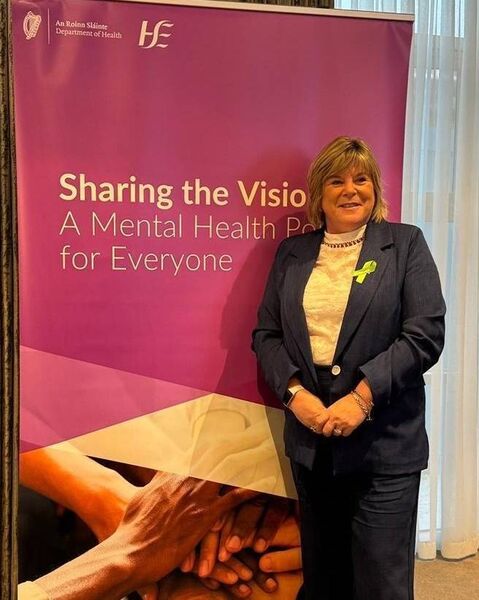Sinn Féin and Fianna Fáil in Waterford give opposing views on Mental Health Bill amendments

Deputy Conor McGuinness expressed criticism over Minister Butler's lack of support for his party's proposed amendments to the Mental Health Bill
Sinn Féin's, Deputy Conor McGuinness and Fianna Fáil's, Minister Mary Butler have given opposing views to Waterford News & Star in relation to the Mental Health Bill.
Deputy McGuinness said all mental health law must guarantee access and that a 'no wrong door' approach is essential for it to be successful.
It was a point he made when speaking about the issue in the Dáil recently (see video clip below)
Commenting on the matter to the newspaper and to waterford-news.ie, Deputy McGuinness expressed criticism of Minister Butler's refusal to accept his party's amendments to the Mental Health Bill.
He said the Bill needs "a stronger, rights-based framework to ensure no one is turned away when seeking help".
The Sinn Féin Deputy also said the legislation must "enshrine" the principle that mental health services are open to all, regardless of diagnosis, background or additional needs.
“When someone reaches out for help with their mental health, regardless of other conditions or issues such as addiction, disability or nuerodivergence, they shouldn’t be told to go elsewhere," he said.
"That’s not good enough; the system must be designed so that there’s no wrong door," he added.
Deputy McGuinness, who spoke during the committee stage of the Bill, backed Sinn Féin’s package of amendments aimed at improving access, particularly for those with dual diagnoses or complex needs. However, the Government rejected every proposal.
“The Minister of State for Mental Health, Mary Butler, failed to support practical and necessary changes," he said.
"This was a missed opportunity to deliver genuine reform and a more compassionate system,” he added.
He also noted that no Fine Gael TDs attended the four-hour debate or made any contribution on the legislation.
“Not a single Fine Gael voice was heard. That speaks volumes about their commitment to mental health reform," he said.
Deputy McGuinness said too many people are being failed by a system that he feels creates barriers instead of offering support.
“We all know the stories — someone with addiction told to fix that first before mental health services will help," he said.
"Or a person awaiting an ASD diagnosis left without support because they don’t yet tick the right box," he added.
"That’s not person-centred care; it’s exclusion by design.”
He said his party will continue to press for a modern mental health service focused on early intervention, integrated supports, and local accessibility.
“People should never be punished for complexity or left without support just because their needs don’t fit a neat box," said Deputy McGuinness.
"A real mental health system leaves no one behind and that’s what we’re working to deliver," he added.

When contacted about the matter and Deputy McGuinness' concerns and criticism of her lack of support for his party's proposed amendments to the Bill, a spokesperson for Minister Butler said she was delighted to bring the Mental Health Bill to Committee state.
The Minister had also engaged in the Dáil debate on the matter "in good faith".
"Over 240 Government amendments to the Bill were prepared, which sought to respond to the concerns of some stakeholders and introduce positive changes to improve the operability of the Bill," said the spokesperson, in a statement issued on behalf of Minister Butler.
"The Bill will overhaul our mental health legislation and introduce a stronger, rights-based approach to involuntary admission and sets out a robust legal framework for the delivery of mental health services," he added.
The spokesperson went on to comment: "The Minister spoke in detail in the chamber last week, outlining her reasoning for opposing various amendments proposed by opposition. A number of amendments proposed by Sinn Féin either directly duplicated provisions that are already in the Bill as initiated, or else were inappropriate for inclusion to the Bill."
"The Minister expressed her grave concerns in relation to a number of other Sinn Féin amendments during the debate as these amendments did not promote a rights-based approach to mental health service delivery, particularly in relation to people who are involuntarily admitted to acute mental health settings," said the spokesperson.
"A Sinn Féin amendment proposed to extend the period of time a person can be held against their will before an examination by a consultant psychiatrist to 72 hours from the 24 hours provided for in the Bill as published," he added.
"The existing Mental Health Act, enacted over 20 years ago, only permits a person to be held for 24 hours before an examination must take place and an order made to admit the person involuntarily or not made, and the person released."
The Minister's spokesperson said: "If this amendment had been carried, it would have represented a serious regression in the rights of people who are subject to the involuntary admission process."
In the statement Minister Butler also referred to another amendment proposed by Sinn Féin which sought to remove the mandatory requirement that an examination by an independent consultant psychiatrist take place, where a change of status is sought from voluntary to involuntary, in an acute mental health setting: "The independence of the second examination is of the utmost importance to ensure that there is appropriate independent oversight of reclassifying a person’s status to an involuntarily admitted person. Such an amendment would not introduce a rights-based framework to mental health services."
Meanwhile, the Minister's spokesperson said that another Sinn Féin amendment proposed making the lack of capacity as a criterion for involuntary admission.
"Such an amendment does not recognise that capacity is not a binary and can fluctuate over time, and even within a day," he said.
"Making the lack of capacity grounds for involuntary admission would mean that cohort of people who require involuntary admission, but who retain some level of decision-making capacity, would not be able to be involuntarily admitted," he added.
"This would mean that people in need would be left untreated because they do not meet the criteria for admission proposed by Sinn Féin."
Minister Butler's spokesperson then commented: "The Minister believes that, had all Sinn Féin amendments been carried, this would have created a less compassionate mental health system. Rather, the amendments proposed by Sinn Féin would have been a worrying step backwards for the rights of people accessing mental health services."
"The Mental Health Bill represents years of drafting, research, and consultation with a wide range of stakeholders, representing different professional groups, people with lived experience and their loved ones, and key Government and NGO partners," he said.
"Minister Butler is confident the Government amendments will make the Bill stronger, make it easier to implement, and will better protect and vindicate the rights of people," he added, before commenting: "The Minister is willing to work with Deputies on further amendments to the Bill, if required, if such amendments are appropriate to the legislation and where such amendments further enhance the person-centred framework being introduced in the Bill."






